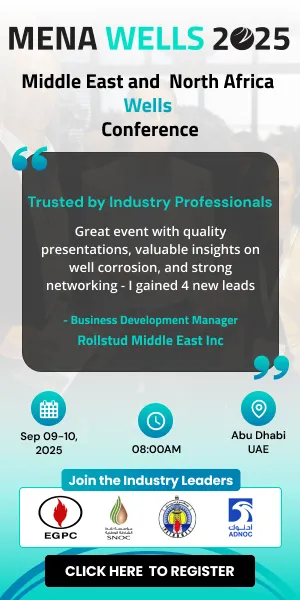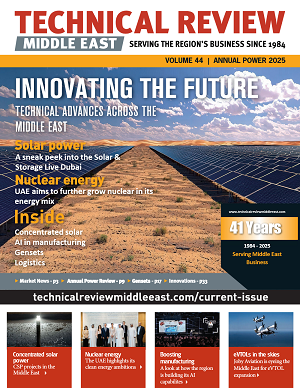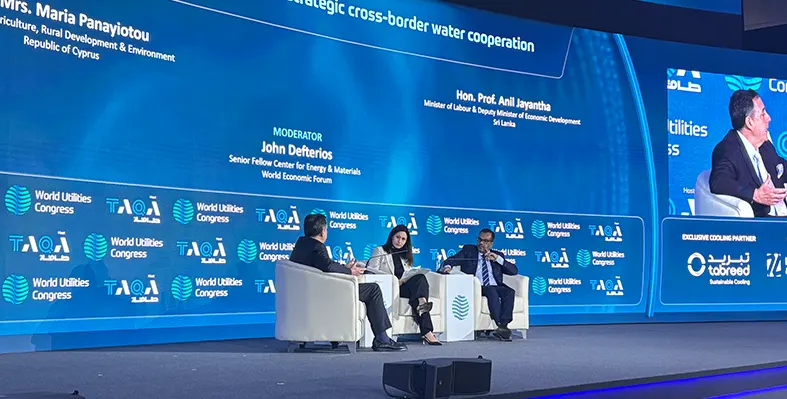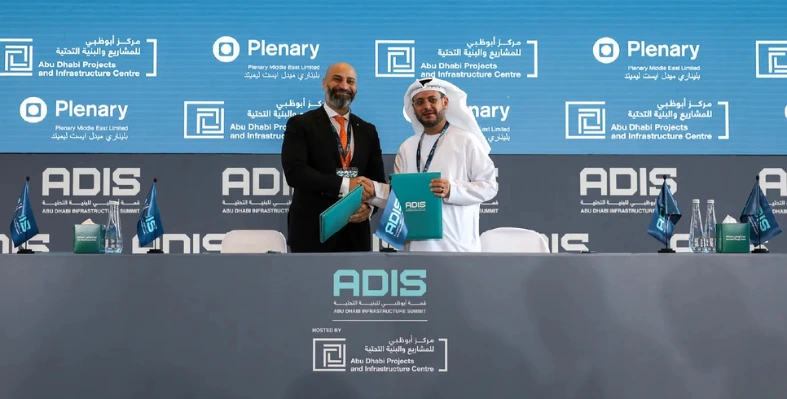In The Spotlight
Maersk Saudi Arabia (Maersk) and the Saudi Post Company (SPL) have signed a strategic Memorandum of Understanding (MoU) to enhance logistics and supply chain services for ecommerce companies operating in Saudi Arabia and potentially the wider GCC region.
The agreement aims to create a unified service model that meets the growing demand for efficient, end-to-end logistics solutions across regional and global markets.
The partnership will integrate Maersk’s global shipping and logistics capabilities with Saudi Post’s strong national delivery network.
By aligning their strengths, both organisations aim to offer a seamless logistics experience tailored to international eCommerce businesses looking to establish or scale operations within the Kingdom.
Enhancing regional logistics
Saudi Post’s in-country network, developed in line with Vision 2030 objectives, will connect with Maersk’s international infrastructure to deliver greater speed, efficiency, and reliability to customers.
Under the partnership, Saudi Post will manage all domestic services, including express customs clearance and last-mile delivery, while Maersk will handle the origin-side operations, international transport, and bonded fulfilment.
The collaboration will be supported by Maersk’s newly inaugurated Integrated Logistics Park in Jeddah, positioning Saudi Arabia as a vital regional logistics hub.
The MoU outlines joint efforts in digital system integration to ensure smooth data exchange, shared marketing and commercial initiatives to target global ecommerce clients, unified customer service protocols for consistent quality, and operational improvements to optimise capacity and performance.
This strategic alliance is expected to accelerate the development of a robust ecommerce ecosystem and reinforce the Kingdom’s role as a logistics leader in the Middle East.
"We are excited to partner with Saudi Post, who operate an unparalleled distribution network in Saudi Arabia, to create an integrated logistics solution that addresses the growing demand for efficient eCommerce fulfilment in the country," said Ahmed Al Olaby, director, Maersk Saudi Arabia, after signing the MoU. "Our extensive, global ocean network, along with the newly opened Integrated Logistics Park, would combine with Saudi Post's extensive domestic network, positioning us to deliver world-class logistics services that support businesses looking to enter or expand in the Saudi market."
“The strategic collaboration between SPL and Maersk is pivotal in streamlining cross-border e-commerce flows to and from The Kingdom of Saudi Arabia and the wider GCC, enhancing connectivity, reliability, and growth opportunities across the region”, said Rouni Saad, international business sales director, SPL Group.
Both companies said that the MoU "directly contributes to Saudi Arabia's Vision 2030 objectives by enhancing the Kingdom's logistics infrastructure, supporting the growth of the eCommerce sector, and facilitating international trade."
This could attract more international businesses to set up shop in Saudi Arabia, while providing them with reliable and efficient logistics solutions.
Also read: Saudi Global Ports awarded terminal concessions on the Kingdom's eastern coast
Alcoa Corporation has finalised the sale of its 25.1% stake in the Ma’aden joint venture to Saudi Arabian Mining Company (Ma’aden), marking a strategic exit from the integrated mining complex the two companies launched in 2009.
The transaction was completed under a binding share purchase and subscription agreement.
In exchange, Alcoa received around 86 million Ma’aden shares, valued at approximately US$1.2bn, alongside US$150mn in cash, which will primarily be used to cover taxes and transaction costs.
The company expects to report a gain of roughly US$780mn under other income for the third quarter of 2025.
In line with past asset sales, this gain will be recorded as a special item.
Saudi mining growth
Alcoa, which is based in Pittsburgh in Pennsylvania, is a global leader in bauxite, alumina, and aluminium products. It will now hold an estimated 2% of Ma’aden’s outstanding shares.
As stipulated in the agreement, these shares must be retained for a minimum of three years, with one-third eligible for sale after each of the third, fourth, and fifth anniversaries of the transaction’s closing.
However, under certain conditions, Alcoa is allowed to hedge or borrow against the shares during the holding period, and the lock-up may be reduced in specific scenarios.
The Ma’aden joint venture, established as a fully integrated aluminium production complex in Saudi Arabia, comprises the Ma’aden Bauxite and Alumina Company (MBAC) and the Ma’aden Aluminium Company (MAC).
Prior to the deal, Ma’aden held a 74.9% majority stake.
Citi served as Alcoa’s exclusive financial advisor for the transaction, while legal counsel was provided by White & Case LLP.
“While today marks the end of the Joint Venture, the closing of this transaction demonstrates the initial value to our shareholders and enables visibility within Alcoa’s financials until we monetize in the future,” said William F. Oplinger, Alcoa’s president and CEO.
“I thank Ma’aden’s leadership and the Kingdom of Saudi Arabia for their partnership over the last 16 years, and we look forward to continued engagement as Ma’aden shareholders.”
Also read: Power Metallic gets licensed to explore Saudi mineral belt
COBOD International, in partnership with Technische Universität Braunschweig, has launched the first commercially available multifunctional construction robot, expanding the scope of 3D printing in construction.
Unveiled during the grand opening of the Digital Construction Site at TU Braunschweig, the system merges COBOD’s BOD2 3D construction printer with a telescopic vertical extension and robotic arm designed for the Shotcrete 3D Printing Process (SC3DP).
Shotcrete, a concrete-spraying technique typically used in complex structures such as tunnels, retaining walls, and swimming pools, forms the basis of the SC3DP system.
However, the telescopic unit’s versatility allows it to host multiple tool types beyond shotcrete, including sanding equipment, paint spray guns, and insulation tools, transforming the 3D printer into a multifunctional robotic platform.
A 3D printing aid
The system offers a dynamic vertical reach of 3 metres, enabling the robotic arm to operate on printed structures situated up to 3 metres below the X-axis.
This functionality allows users to print, reinforce, and finish complex, double-curved concrete walls with precision and geometric freedom. Reinforcement can either be embedded after concrete placement or applied by spraying around prefabricated reinforcement meshes.
The launch was attended by Helga Kühnhenrich, Head of Research and Innovation in the Construction Industry at Germany’s Federal Institute for Research on Building, Urban Affairs and Spatial Development (BBSR), who highlighted the growing industry focus on automation to cut costs and reduce labour dependence.
According to COBOD, the robotic system can even be equipped with a gripper to automatically install prefabricated elements such as aerated concrete blocks or bricks, features traditionally outside the scope of standard 3D printing setups.
With this, the company aims to redefine what construction robotics can achieve, merging digital precision with functional adaptability.
Henrik Lund-Nielsen, general manager and founder of COBOD International, said, “For years we have had the vision of making multifunctional construction robots on the basis of our 3D construction printers. Seeing the first materialisation of our vision here makes me very proud. With this new technology we offer automation of many more construction processes than just printing of concrete walls. With our new COBOD robotic arm at the end of the telescopic arm there is an endless amount of construction tasks that our printing system can now automate and expedite to the benefit of our global customers.”
Professor Harald Kloft for Structural Design at ITE explained, “Our partnership with COBOD is a decisive step towards the digital construction site of the future. 3D printing enables automated, digitally controlled processes of simple as well as very complex tasks, like the fabrication of reinforced double curved walls. The ability to make complex, individualised, material efficient and low waste construction solutions makes 3D printing ideal for the construction industry, as it brings together economic, environmental and social aspects, such as the reduction of physical stress.”
Also read: Volvo CE excavators undergo rigorous testing; outperform rivals
Lloyd's Register (LR) has signed an agreement with German developer DAI Infrastruktur GmbH (DAI) to provide advisory services for Project Ra, a large-scale green ammonia production and bunkering development at East Port Said, Egypt
Project Ra is expected to have a production capacity of up to two million tonnes of green ammonia annually (mtpa), with 1.65mn tonnes produced from renewable energy sources, with production scheduled to start in 2029. Located strategically next to the Suez Canal, it offers a critical bunkering hub for ammonia-fuelled vessels navigating one of the world’s busiest shipping routes. It is expected to play a key role in supplying key European ports with green ammonia, for use as bunkering fuel, electricity generation, and reducing CO₂ emissions in industrial processes such as steel production.
The development aligns with the International Maritime Organization’s (IMO) regulations which will require the use of low- and zero-carbon fuels from 2030 onwards.
LR’s advisory services will cover demand-side pricing analyses, infrastructure planning, asset integrity and risk assessments, regulatory guidance, lifecycle greenhouse gas (GHG) emissions analysis, and market and offtake strategy support. LR will also undertake concept design reviews, feasibility studies and performance benchmarking aligned to ISO 55000.
Panos Mitrou, Global Gas Segment director, Lloyd's Register, said, “Our partnership with DAI demonstrates LR's commitment to supporting the development of critical alternative fuel supply chains that will enable shipowners to navigate the post-MEPC 83 regulatory landscape successfully.
Ioannis Papassavvas, CEO of DAI Infrastruktur, added, “Project Ra represents a critical step in delivering green ammonia at the scale and reliability the maritime sector urgently needs. LR’s advisory support will be vital to ensure Project Ra meets the highest international standards, while aligning with the long-term needs of shipowners and global regulators.”
ACCIONA, along with local firm DHCU, obtained an €35mn (US$38.15mn) contract from Egypt’s Construction Authority for Potable Water and Wastewater (CAPW) so it can operate and maintain Phase II of Cairo's Gabal El Asfar wastewater treatment complex.
The eight-year agreement rehabilitates also upgrades two major plants within the facility so that they can each treat 500,000 m³ per day.
Gabal El Asfar is known to be the largest wastewater treatment complex located in Africa as well as the Middle East. This ranks it third globally, with a total capacity of 2.5 m³ per day.
Home to more than eight million residents, it serves the vital eastern part of Cairo.
ACCIONA’s already established footprint is further reinforced by this latest contract within Egypt’s water sector.
The company led the design, construction, and commissioning in a previous expansion phase at Gabal El Asfar in 2013, adding another 500,000 m³ to its daily capacity.
ACCIONA and DHCU were entrusted not too long ago in 2022 for Phase I's operation and improvement that handles 1.5 m³ of wastewater for each day.
Other developments
Beyond Gabal El Asfar, ACCIONA has partnered together with CAPW on additional projects, and this includes the water infrastructure operations for New Cairo.
The initiative collects water from the Nile River and then transports the water. It then purifies the water and distributes to consumers in the satellite city 30 kilometers east of the capital.
The company constructed five other major drinking water treatment plants throughout Egypt.
The Almerya, Rod el Farag, Mostorod, North Helwan I, and North Helwan II plants serve collectively over six million people because they have a combined capacity that exceeds 600,000m³ per day.
Within ACCIONA’s portfolio is the Bahr Al Baqr wastewater treatment plant. It is actually another key project that is located in northwestern Egypt.
It has 5.6 m³ capacity as one of the world’s largest, designed for high-quality water production for agricultural irrigation.
Additionally, ACCIONA operates several other wastewater facilities in Egypt as these facilities include those located in Abnoub-El Fath, Sodfa-El Ghanayem, El Ayat, and Abu Simbel.
Sustainable infrastructure and renewable solutions are led by ACCIONA globally.
They have been keeping to carbon neutrality since back in 2016.
Operations are maintained in more than 40 countries, also the company reported €19.19bn (US$21bn) in sales for 2024.
Also check out:
MENA platform aims to enhance clean water accessibility
Water diplomacy: how UAE supports island nations' water security
The International Code Council (ICC) looks at how the construction landscape in the GCC is changing, especially with smarter materials, cooling, and policy changes.
Behind the GCC's towering structures and landmark megaprojects lies a critical question: how can the region build in a way that is not only transformative but also sustainable?
As urbanisation intensifies, construction is under mounting pressure to evolve. Sustainability is no longer optional, it is essential. The choices made today will shape the resilience and livability of tomorrow’s cities.
To meet this challenge, governments and developers across the region are actively rethinking how buildings are designed, constructed and operated.
From low-carbon materials to pioneering technologies and updated regulations, the GCC is making bold moves to create a greener built environment.
A major focus is on improving energy efficiency, particularly through smarter cooling.
In a region where air conditioning can account for up to 70% of a building’s energy use, upgrading HVAC systems is both an environmental and financial imperative.
This has spurred the adoption of passive cooling techniques, better insulation, and demand-driven systems powered by renewables, enabling climate control with a lighter carbon footprint.
Green materials
The materials used in construction are also undergoing a transformation.
Concrete, long the backbone of GCC development, is now being refined with low-carbon alternatives and advanced admixtures to reduce emissions without compromising strength or durability.
This shift is being accelerated through regional standardisation and innovation in cement technology.
In parallel, the GCC, particularly the UAE, is leading a global push toward 3D-printed buildings.
These structures reduce material waste, speed up project timelines, and allow for complex, custom designs. They represent a fundamental reimagining of how construction can be more efficient, scalable and sustainable.
Underpinning these efforts are national climate policies like the UAE Net Zero 2050 and Saudi Arabia’s Vision 2030 and Green Initiative.
These frameworks are driving practical action, not just policy statements, supported by updated building codes and new training pathways for professionals.
Programmes from bodies such as the International Code Council (ICC) are equipping the workforce with the skills needed to meet increasingly ambitious environmental standards.
The GCC’s approach to sustainable construction is comprehensive: it combines innovation, policy, and people. In doing so, the region is not just keeping pace with global trends, it is setting new ones.
Through its commitment to smarter, cleaner, and more responsible building, the GCC is demonstrating that environmental stewardship and architectural progress can, and must, go hand in hand.
Also read: ICC to showcase global building safety standards in Egypt
Alcoa Corporation has finalised the sale of its 25.1% stake in the Ma’aden joint venture to Saudi Arabian Mining Company (Ma’aden), marking a strategic exit from the integrated mining complex the two companies launched in 2009.
The transaction was completed under a binding share purchase and subscription agreement.
In exchange, Alcoa received around 86 million Ma’aden shares, valued at approximately US$1.2bn, alongside US$150mn in cash, which will primarily be used to cover taxes and transaction costs.
The company expects to report a gain of roughly US$780mn under other income for the third quarter of 2025.
In line with past asset sales, this gain will be recorded as a special item.
Saudi mining growth
Alcoa, which is based in Pittsburgh in Pennsylvania, is a global leader in bauxite, alumina, and aluminium products. It will now hold an estimated 2% of Ma’aden’s outstanding shares.
As stipulated in the agreement, these shares must be retained for a minimum of three years, with one-third eligible for sale after each of the third, fourth, and fifth anniversaries of the transaction’s closing.
However, under certain conditions, Alcoa is allowed to hedge or borrow against the shares during the holding period, and the lock-up may be reduced in specific scenarios.
The Ma’aden joint venture, established as a fully integrated aluminium production complex in Saudi Arabia, comprises the Ma’aden Bauxite and Alumina Company (MBAC) and the Ma’aden Aluminium Company (MAC).
Prior to the deal, Ma’aden held a 74.9% majority stake.
Citi served as Alcoa’s exclusive financial advisor for the transaction, while legal counsel was provided by White & Case LLP.
“While today marks the end of the Joint Venture, the closing of this transaction demonstrates the initial value to our shareholders and enables visibility within Alcoa’s financials until we monetize in the future,” said William F. Oplinger, Alcoa’s president and CEO.
“I thank Ma’aden’s leadership and the Kingdom of Saudi Arabia for their partnership over the last 16 years, and we look forward to continued engagement as Ma’aden shareholders.”
Also read: Power Metallic gets licensed to explore Saudi mineral belt
Teledyne Gas & Flame Detection (Teledyne GFD) has partnered with Industrial Detection Solutions (IDS) to establish a 699 m² manufacturing facility in Dammam, Saudi Arabia, marking a significant step towards localising production of advanced gas detection technologies in the Kingdom.
The facility, which opened on 19 June 2025, will produce high-precision sensors used in hazardous environments such as oil and gas drilling sites, LNG/CNG plants, and petrochemical facilities.
The initiative supports Saudi Arabia’s IKTVA programme, which encourages economic diversification and local supply chain development in the energy sector.
By bringing manufacturing closer to end users and suppliers, the partnership is expected to reduce lead times and enhance safety support across the region.
Key products to be produced at the new plant include Teledyne GFD’s DM-700 toxic gas sensor, and the FP-700 and IR-700 sensors for combustible gas detection.
These ‘smart’ sensors offer non-intrusive monitoring using electrochemical, catalytic bead, and infrared technologies, with robust designs that resist common causes of failure such as water ingress, corrosion, and vibration.
“Our new partnership with Industrial Detection Solutions ensures that manufacturing is closer to both customers and suppliers, enabling even faster delivery of class-leading gas detection products in support of more efficient supply chains,” said Thomas Moeller, VP Sales & Marketing at Teledyne GFD. “The proven solutions manufactured in KSA will better serve a vast regional industry that recognises the importance of a robust and prevalent safety culture. We are proud to be part of KSA’s remarkable ongoing journey of economic and industrial growth, and we look forward to a successful future together.”
Teledyne GFD recently also introduced the PS DUO, a new portable dual-gas detector designed to improve personal safety in hazardous environments. The compact handheld device can detect two gases simultaneously using passive diffusion sensing, and features real-time monitoring with audible, visual and vibrating alarms to alert users when gas levels exceed safe limits.
The PS DUO offers a broad selection of gas combinations including carbon monoxide (CO), hydrogen sulphide (H₂S), sulphur dioxide (SO₂), ammonia (NH₃), oxygen (O₂), hydrogen (H₂), nitrogen dioxide (NO₂), and ozone (O₃). Its ATEX/IECEx rating and 2-year warranty make it ideal for industrial settings. Users can select gas pairings tailored to their specific applications, such as H₂S and SO₂, particularly relevant in Middle Eastern operations.
The detector features a bright LCD screen displaying continuous gas concentration, wireless connectivity for easy data transfer, and internal memory capable of storing 30 alarm logs. Housed in a rugged IP67-rated rubberised casing, the PS DUO is lightweight (200g), ergonomic, and designed for comfort and ease of use in demanding environments. It runs for up to two years on a single replaceable battery.
Jumia, Africa’s leading e-commerce platform, has taken a significant step in reinforcing its presence in Egypt with the inauguration of a new integrated warehouse on Suez Road, Cairo
This development marks one of Jumia’s largest investments in the country and demonstrates its continued confidence in Egypt’s strategic role in Africa’s economic and logistical landscape.
Spanning over 27,000 sq m, the new facility is designed to optimise Jumia’s logistics capabilities by improving storage efficiency and speeding up deliveries, particularly to Upper Egypt. The warehouse is equipped with advanced smart systems that enhance order processing and customer satisfaction. As a key component of Jumia’s logistics infrastructure, the centre supports the company’s future expansion and aims to better serve merchants and consumers across the country.
This investment aligns with Jumia’s mission to boost Egypt’s digital economy and enhance its service offerings. It will also provide tailored logistics solutions for local manufacturers and merchants, reinforcing the platform’s support for domestic production.
The warehouse is projected to generate up to 10,000 direct and indirect jobs over the coming years, solidifying Jumia’s contribution to national economic development and youth empowerment.
Prime minister Dr Mostafa Madbouly commended the initiative, remarked, "We welcome this move by Jumia, which reflects the trust that major global companies have in Egypt’s investment climate. We look forward to more partnerships that support the state's goals in digital transformation, the development of logistics infrastructure, and the provision of job opportunities for Egyptian youth."
Abdel Latif Olama, CEO of Jumia Egypt, expressed his appreciation for the government’s support, stated, "We are proud of this achievement, which reflects Jumia’s long-term investment commitment in Egypt. We view Egypt as a strategic hub for our operations in the region. This warehouse represents a qualitative leap in the level of services we provide to our customers and partners, and it supports our vision of becoming an integrated platform that combines technology and logistics across the continent. It will also contribute to our growth in the Egyptian market."
Egypt also plays a critical role in Jumia’s tech ecosystem, hosting one of its largest technology hubs on the continent. This centre is home to a skilled team of engineers and developers who are building digital tools and logistics solutions to support operations across Africa.
During the inauguration, Olama delivered a presentation detailing Jumia’s impact in both Egypt and broader African markets. He also outlined plans for future expansion, reaffirming Egypt’s strategic importance to the company.
The launch of this facility is part of Jumia’s wider expansion strategy aimed at strengthening its infrastructure across Africa. Similar logistics centre s have already been established in Nigeria, Ghana, Ivory Coast, and Morocco, reinforcing the company’s role in advancing digital commerce and economic development across the continent.




























































